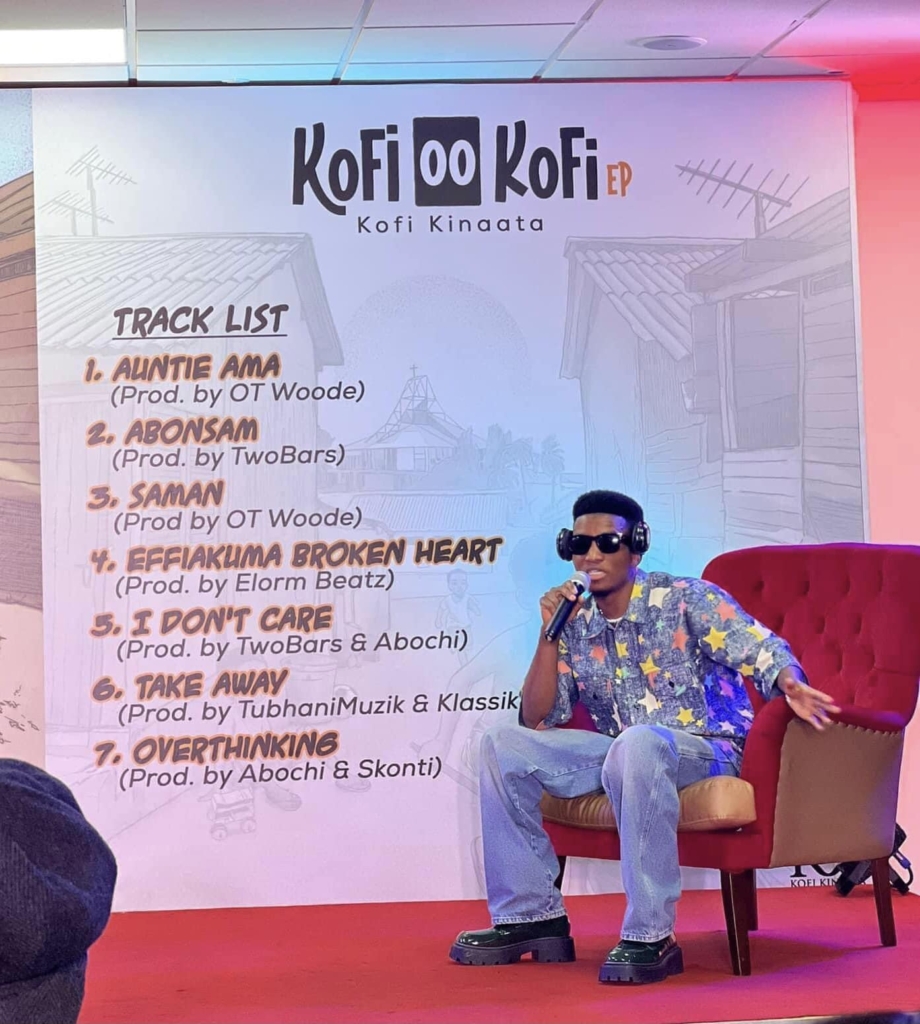Artiste: Kofi Kinaata
Producers: OT Woode, Two Bars, Abochi, Tubhani Muzi, Klassic, Elorm Beatz, Skonti
Author of Review: Kwame Dadzie
Since the release of his first single Obi Ne Ba in 2011, Kofi Kinaata has produced many hit songs including ‘Sweetie Pie’, ‘Confusion’, ‘Things Fall Apart’. However, he had always shuddered the idea of releasing a body of work.
He had earlier thought that albums or EPs were waste of songs. He once said in an interview with the late Doctar Cann of Happy FM that a lot of music consumers hardly listen to all the songs on an album or EP. However, if songs are released individually, the are patronised and the artiste has time to promote them well.
Upon requests by his fans and music enthusiasts, Kofi Kinaata has finally released his first ever anthology of songs, the ‘Kofi oo Kofi’ EP.
Before the EP would come out on Friday, May 10, 2024, there was a listening session at the Accra City Hotel. The media and other music stakeholders, had the opportunity to preview the songs before they went public.
This is a seven-track project that comprises songs like ‘Auntie Ama’, ‘Abonsam’, ‘Saman’, ‘Effiakuma Broken Heart’, ‘I Don’t Care’, ‘Take Away’ and ‘Overthinking.’

Auntie Ama: The EP opens with a lovely tribute to Kofi Kinaata’s mother, affectionately called Auntie Ama. He eulogises his mother for caring for him and tolerating his troublesome behaviour while growing up in Effiakuma, a suburb of Takoradi. He would move out of the house, roam the township, go home late, and pick fights with people. He mentions his mother's counsel on many aspects of life. For example, he highlights his mother's advice to pay attention to his books and not pay heed to bad friends.
Produced by OT Woode, the song is rendered 6/8 time, done in Key D minor, employing rich Ghanaian rhythms, with vestiges of 'apatampa', a Fante recreational music form. This is very unusual of Kofi Kinaata; the first time he is employing this particular rhythm which is a staple of most African societies.
The guitars, harp, castanets, rattles, horns and other traditional African instruments, set this song apart from every record Kofi has released since he stepped threshold of the music space.
The icing on the cake in this song is the use of Ahanta, a language spoken by some people in the Western part of Ghana, including his beloved mum.
Abonsam: One observation I made about Kofi's EP is the use of minor scales. Minor scales usually trigger somber moods. He used this scale in 'Auntie Ama' and 'I Don't Care.' This strategy gives the work a very refreshing feel. It breaks the monotony and likeliness of unintentionally repeating progressions and melodies in a number of songs. 'Abonsam', produced by Two Bars, was composed in Key F# minor, and in a 4/4 time signature.
In 'Abonsam', Kofi attributes the challenges he is going through to the devil or Satan. He is saddled with unemployment, debts, and untold misery. He suggests that the devil lives with him, a reason he is going through difficult times.
Again, Kofi delves into a different music style. This passes for an afrobeat (without an 's') piece, one that could pass for a playlist of songs from Ebo Taylor or Fela Kuti.
Saman: This song is in tandem with Kofi Kinaata's Goodwill Ambassadorial initiative for the International Organization for Migration (IOM). It tells the story of a young man, who after suffering the scourge of hardship, decides to travel out of the country upon the advice of a close friend who had already left for Libya.
He sells his properties to 'jakpa' to Libya. He travels through the desert to meet his friend. The friend takes Kofi's luggage, tells Kofi to wait for him. To Kofi's disappointment, his friend bolts with the things, leaving him at the lonely place.
Kofi, in the song expresses his shock at how his best friend wanted him dead.
'Saman' is another song on the 'Kofi oo Kofi' EP also done in 6/8 time (just as Auntie Ama), in Key D Major. It employs quintessential Ghanaian highlife guitar pattern; one that is likely to evoke nostalgia among old highlife fans. The music style is one steeped in what is called 'ebibinwom' by Akan societies.
Effiakuma Broken Heart: If I was asked to suggest a remedy for people who are suffering heartbreak from failed love relationships, I would suggest they take a dose of 'Effiakuma Broken Heart', three times daily. It's amazing how Kofi was able to lump emotions from various broken individuals into one creative piece. Kinaata, in the song, sings about going through so much pain as a result of being jilted by his girlfriend. His vivid narrations of things he did with the lady while they were together would resonate with anybody in a similar situation. Kofi suggests the woman might have left him because of money.
'Effiakuma Broken Heart' is done in Key G Major in slow tempo 2/4 time.
I Don’t Care: In a generation where people are easily pressured into living lifestyles they cannot afford, this song is more than a sermon. Kofi, in this piece insulates himself from life's uncertainties and the challenges it comes with. After suffering broken heart, he armours his heart and mind with an 'I don’t care' attitude. He stresses that a lot of people worry too much about what they don’t have when they can rather concentrate and be thankful for what they have. This song is also in a minor scale (E) but in 2/4 time slow paced timing.
Take Away: During the EP listening, Kofi said that he and his team decided to tinge the EP with at least one song that his core fans and the masses would easily relate to - something that can break the monotony of his 'experimentation' of new sounds. 'Take Away' is a much danceable tune, unlike the others. It passes for a party or wedding song. After going numb to his problems in 'I Don't Care', he gets into a groovy mood. It is interesting how Kofi gets to sing about love again after suffering a broken heart. This clearly preaches resilience; an indication that if people pick themselves up after suffering relationship issues and heartbreaks, they surely stand the chance of falling in love again. This piece of beautiful music is done in Key F Major.
Overthinking: The 'Kofi oo Kofi' EP seamlessly transitions to another song done in Key F Major: the track 7, 'Overthinking'. I call it the 'nyansapow' of the entire project. It sums up the EP.
'Overthinking' reiterates the message in 'I Don’t Care' and concludes the EP's story with advice. The EP is about life from the cradle, mother’s love, life while growing up, encounter with adversaries cloaked in the apparels of loved ones, life's challenges and the quest to make it in life. 'Kofi oo Kofi' also accentuates the tussle with finding love, something almost everybody can relate to.
Falling in love again as demonstrated in 'Take Away', is symbolic of regaining one’s glory after being shattered by life’s woes (in Effiakuma Broken Heart).
To wit, 'Overthinking' didactically asserts that life comes with problems and happy moments but when the down times come, worrying too much does not solve the problem. It rather causes more pain, causes depression and in most cases disrupts God's purpose for one's life.
Latest Stories
-
Wontumi’s EOCO arrest and detention violates constitution – Hassan Tampuli
44 minutes -
Weakening Dollar: An Opportunity for Developing Economies to Grow
1 hour -
Livestream: Newsfile discussing Wontumi’s detention, CJ removal case
2 hours -
One Million Coders’ Programme to train youth in AI, Cybersecurity – Omane Boamah to LSE Forum
2 hours -
Africa stands at a crossroads of possibility – Dr Omane Boamah tells LSE Forum
2 hours -
Operations at Maaha Beach Resort remain unaffected in spite of devastating fire incident
2 hours -
Africa must shape its future; not sit on the sidelines – Omane Boamah tells LSE Forum
2 hours -
I’ll stay out of the politics and theatrics – Wontumi’s lawyer
2 hours -
Augusco beats Mfantsipim to clinch Central Region Table Tennis trophy
3 hours -
Liverpool sign Jeremie Frimpong from Leverkusen for £29.5m
4 hours -
UN Peacekeeper Day: Championing Partnership, Shaping a Peaceful Future
4 hours -
Parliament approves GHS10 billion for National Health Insurance Authority
5 hours -
Mentally challenged person beheads man in Tema
5 hours -
Ghana Digital Centres Limited hosts successful Tech Startup workshop
5 hours -
Ghanaian Policeman secures podium finish at global INTERPOL cyber warfare competition
5 hours

